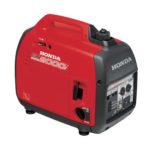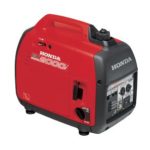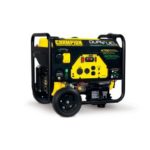A portable generator is handy if you enjoy camping or the outdoors. Even at home, you can use a generator to power your home if there is a power outage.
A quiet generator is better than a portable generator, so you don’t disturb nature and the people around you.
1. What is a Quiet Decibel Rating For a Generator?
A quiet generator in a home can use about 50 dBA. A generator with a rating that ranges between 50 to 60 dBA is a quiet generator.
Any generator with a higher dBA rating will be too loud and annoying. Many generators typically generate a noise that has a higher rating than this.
2. Can I Make my Generator Quiet?
Yes, you can make a generator quiet. One of the most common strategies to make a generator quiet is installing a larger placement muffler. The role played by the muffler is to muffle the sound coming out of the exhaust pipe attached to the generator’s motor. This will make your generator run quietly.
3. Is 76 dB Loud For a Generator?
Everyone should know that ten times the noise level is created for every ten decibels. In a nutshell, 76 dB is ten times louder than 66 dB. This insight helps one understand how decibels are measured. Decibels are also measured 7 yards or 7 meters away from the generator. A 76-decibel generator is considered a loud generator.
4. Is 65 dB Loud For a Generator?
65 dB isn’t too loud for a generator. It generates a sound that is considered moderate noise. If it gets higher than 70 dB, then one can assume it is very loud. Therefore, a 65 dB generator can be ideal for use at home. It will neither be a nuisance to your family nor your neighbors.
Decibel (Loudness) Comparison Table
| Environmental Noise | Decibel |
|---|---|
| Whisper quiet library | 30 dB |
| Normal conversation | 60 – 70 dB |
| Telephone dial tone | 80 dB |
| City traffic (inside the car) | 85 dB |
| Train whistle at 500 feet, truck traffic | 90 dB |
| Subway train at 200 feet | 95 dB |
| The level at which sustained exposure may result in hearing loss | 90 – 95 dB |
| Snowmobile, motorcycle | 100 dB |
| Power mower at 3 feet | 107 dB |
| Power saw at 3 feet | 110 dB |
| Sandblasting, loud rock concert | 115 dB |
| Pain begins | 125 dB |
| Even short-term exposure can cause permanent damage | 140 dB |
| Jet engine at 100 feet, gun blast | 140 dB |
| Death of hearing tissue | 180 dB |
If you want to see a comparison of loudness in decibels, you can watch this YouTube video.
5. What Differs Between a Regular And Inverter Generator?
One significant difference between an inverter generator and a conventional generator comes in the current they produce. One should be aware that traditional generators have AC electricity while the inverter generator produces electricity in three major phases. They include high-frequency alternate current to direct current and stable alternate current.
Another significant difference comes in the power they produce and their fuel efficiency. The conventional ones are capable of generating more power when compared to inverter generators. Some factors that lead to this include the fuel tank size and make and electricity production.
Regarding efficiency, inverter generators carry the day here thanks to how they generate their current production. The inverter generator’s engine can automatically adjust to load, which is something that conventional generators cannot do.
When it comes to fuel efficiency, inverter generators have the upper hand. Their fuel consumption rate is lower compared to that of conventional generators.
Related: Best Inverter Generators
6. How Loud Can a Generator Be In a Campground?
When in a campground, you should only have a generator whose noise levels are low enough in a way that it does not interrupt any other camper in the park. One should go for a generator that produces noise levels below 65 dB. The noise levels of such a generator are manageable and will not cause any disturbance to other campers on the par.
7. How Do You Soundproof a Generator Enclosure?
You can soundproof a generator enclosure by adding foam mats as an additional layer to the inside of the soundproof box. Foam mats will help reduce the sound produced by the generator by absorbing the sound waves and ensuring it doesn’t get out of the soundproof box.
8. Can I Put a Big Muffler on My Generator?
Yes, you can do this. You can easily add an automotive muffler to muffle the sound of your generator. Though this is not the ideal method, it can achieve a 15-decibel reduction. All that you need is an automotive muffler, a few tools, and a little bit of creativity.
To see a video of a muffler on a generator, check out this video.
9. Can I Leave My Generator Out in The Rain?
No, it would be best if you did not leave your generator out in the rain. Manufacturers of these generators have made it clear that generators should not be used in the rain at any given time. This recommendation is largely due to safety concerns.
Generators do produce powerful voltage. If you add wet conditions to this, it could result in electrocution or some explosion. In addition, leaving your generator in the rain will damage it and shorten its lifespan. Water can rust and corrode metal parts, and moisture can cause electrical problems.
If you must use your generator in wet weather, keep it under a tarp or some other shelter to protect it from the elements.
10. Can an Inverter Generator Run a Refrigerator?
An inverter converts a DC power battery to AC household power to run appliances in your home like a refrigerator. Inverters come in various capacities, such that there are powerful enough to operate a fridge. Consider the size of the inverter and the battery capacity it requires relative to your fridge.
This consideration will help you have a suitable inverter to give the needed AC output for the appliances.
11. Can You Plug a Generator Into a Dryer Outlet?
This method is dangerous and can be considered illegal. Back feeding is when you connect a generator to an appliance outlet. This method makes the power flow in the opposite direction.
If you do that using a dryer outlet, backward power will serve the whole house. This method will even cause harm to the neighbor using the same electric main. If a neighbor is operating on other appliances will get shocked, and the effects can be fatal.
12. Can Generators Explode?
Your generator can explode because of careless usage, lack of maintenance, especially preventive ones, and gas spillage. When the unit catches fire, it ignites the fuel tank leading to an explosion. Proper handling of installation and maintenance will prevent the risk.
13. Should You Turn Off The Main Breaker When Running The Generator?
Always turn your generator circuit breaker off before starting. This method prevents the load from drawing power before the generator is on a smooth run. If you want to stop the generator, turn off the breaker first.
14. Can I Plug My Generator Into My House?
A generator can be a great way to provide backup power during a power outage. However, it is important to understand the risks involved in connecting a generator to your home. If you connect the generator directly to a wall outlet, you bypass the fuse or circuit breaker protection. This can cause damage to your home wiring and create a fire hazard.
The safest way to connect a generator to your home is through a double-throw switch or pole. This will ensure that your home wiring is protected and that you can safely use the generator during a power outage.
Conclusion
A generator can be a great way to provide backup power during a power outage. However, it is important to understand the risks involved in connecting a generator to your home. If you connect the generator directly to a wall outlet, you bypass the fuse or circuit breaker protection. This can cause damage to your home wiring and create a fire hazard.
The safest way to connect a generator to your home is through a double-throw switch or pole. This will ensure that your home wiring is protected and that you can safely use the generator during a power outage.




